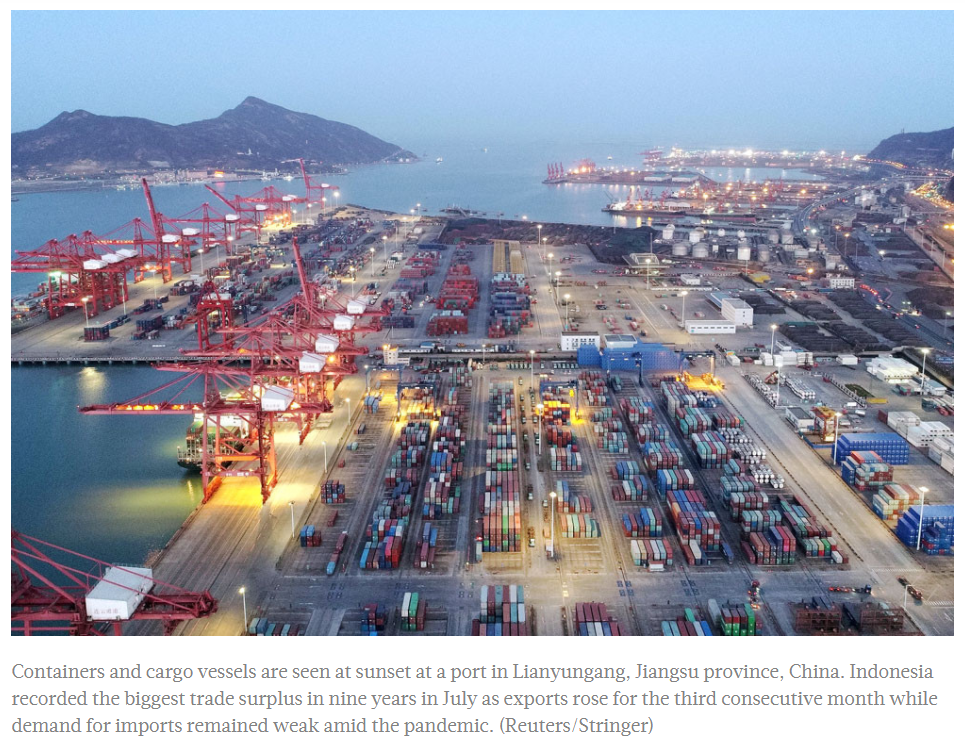Indonesia logs biggest trade surplus in nine years, higher exports for three consecutive months
Indonesia recorded the biggest trade surplus in nine years in July as exports rose for a third consecutive month while demand for imports remained weak amid the pandemic.
Exports jumped 14.33 percent month-on-month (mom) in July to US$13.73 billion, continuing the upward trend since May, thanks to rising shipments of agriculture and manufactured goods despite the figure being 9.9 percent lower than in the same month last year, Statistics Indonesia (BPS) announced on Tuesday.
Imports stood at $10.47 billion in July, 32.55 percent lower annually and 2.73 percent lower than June, as domestic demand for consumption and raw materials remain subdued amid the pandemic.
The rise in exports and fall in imports led to a $3.26 billion trade surplus, the highest since August 2011, according to BPS.
“It is impossible for exports to immediately return to positive [annual growth] after an economic slump caused by COVID-19, but the [monthly] improvement is an encouraging sign,” BPS head Suhariyanto told reporters. “We are hoping that exports will continue to rise in the coming months.”
The coronavirus outbreak has hit international trade amid movement restrictions implemented in various countries around the world, including in Indonesia. The World Trade Organization (WTO) projects global trade volumes will contract by between 13 percent at best and 32 percent at worst this year.
Indonesia, however, has managed to book a strong trade surplus as imports fall deeper than exports. The country had recorded a trade surplus of $8.75 billion as of July compared to a $2.15 billion deficit logged in the same period last year.
Net exports were also the anchor of Indonesia’s gross domestic product (GDP) in the second quarter as the only positive contributor to the economy amid shrinking household spending, investment and government spending.
The rupiah, however, depreciated 0.34 percent on Tuesday to Rp 14,845 per United States dollar, while the Jakarta Composite Index (JCI) gained 0.9 percent.
BPS data revealed that bullion and jewelry exports recorded the highest increase in July compared to June as gold prices broke the record high in the month, followed by exports of animal and plant fat and oil, vehicles and vehicle parts. Meanwhile, Switzerland, the US and Singapore became the top three export destinations that recorded the highest monthly growth in July.
Exports of manufactured goods, which contributed around 80 percent of total exports, rose 16.95 percent mom to $11.28 billion in July but remained 1.91 percent lower year-on-year (yoy). Exports of agricultural products rose 11.17 percent yoy to $350 million driven by increased exports of bird nests and aromatic medicine, among other things.
Mining products exports, the second-largest contributor, plummeted almost one-third annually to $1.39 billion due to falling coal prices. Oil and gas exports, on the other hand, halved to $700 million due to falling oil prices but increased 23.77 percent mom.
Imports of consumer goods fell 24.11 percent yoy following a sharp decrease of garlic shipments from China and medicine from the United Kingdom, among other items.
Imports of raw materials plummeted 34.36 percent due to lower demand of raw sugar from Brazil and milk from the US while imports of capital goods dropped 29.25 percent yoy.
Indonesia’s exports are expected to drop 5 percent at best or 14 percent at worst this year compared to 2019 as the pandemic disrupted the supply chain and weakened global demand for made-in-Indonesia products, said the lead economic researcher at the Centre for Strategic and International Studies (CSIS), Yose Rizal Damuri.
“China’s economic recovery since April has boosted demand for Indonesian goods,” he said in a phone interview on Tuesday. “That will continue to be the main factor that helps Indonesian exports at a time when demand from other countries has yet to recover.”
Indonesia’s lack of dependence on the international markets will not heavily affect the country’s GDP this year, Yose went on to say, adding that the trajectory of the economy would depend on domestic consumption.
“If the government could handle the pandemic and boost consumption, then progress of economic recovery may become faster.”
The demand from major export destination countries has started to recover following the reopening of economies across the globe, which will further support Indonesia’s exports, Bank Mandiri chief economist Andry Asmoro said.
“Going forward, we see import growth will remain weaker than export growth due to suspensions in some domestic investment projects and production activities amid the COVID-19 pandemic,” he said, adding that the situation might result in a narrow current account deficit.
Source: https://www.thejakartapost.com/news/2020/08/18/indonesia-logs-biggest-trade-surplus-in-nine-years-higher-exports-for-three-consecutive-months.html


 English
English




